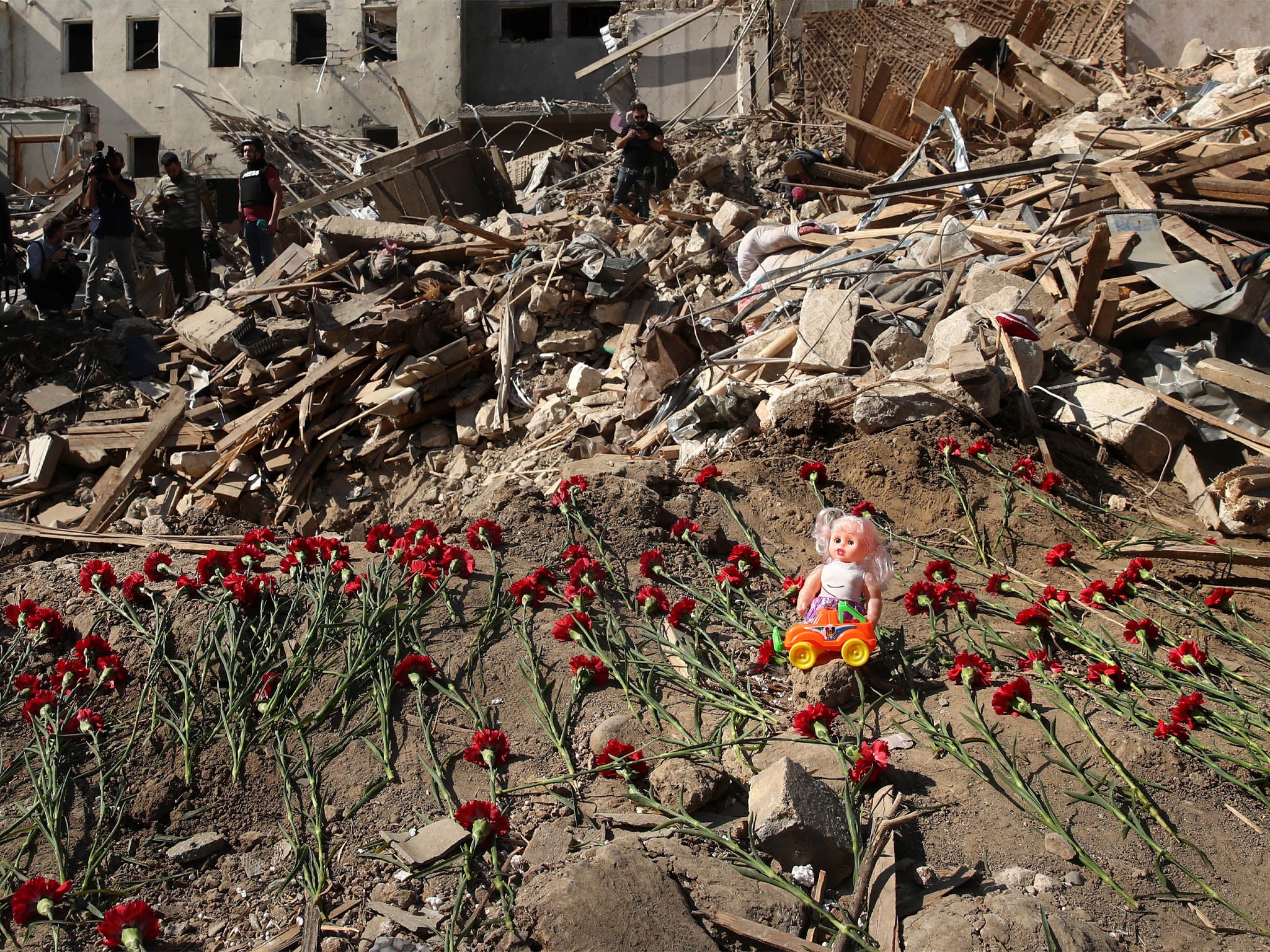Humanitarian crisis feared as Nagorno-Karabakh ceasefire buckles
The death toll has continues to rise three days after Russian-brokered ceasefire agreed

Your support helps us to tell the story
From reproductive rights to climate change to Big Tech, The Independent is on the ground when the story is developing. Whether it's investigating the financials of Elon Musk's pro-Trump PAC or producing our latest documentary, 'The A Word', which shines a light on the American women fighting for reproductive rights, we know how important it is to parse out the facts from the messaging.
At such a critical moment in US history, we need reporters on the ground. Your donation allows us to keep sending journalists to speak to both sides of the story.
The Independent is trusted by Americans across the entire political spectrum. And unlike many other quality news outlets, we choose not to lock Americans out of our reporting and analysis with paywalls. We believe quality journalism should be available to everyone, paid for by those who can afford it.
Your support makes all the difference.Armenia and Azerbaijan accused each other on Tuesday of violating a humanitarian ceasefire agreed three days ago to quell fighting over Nagorno-Karabakh, drawing warnings from international groups of a humanitarian crisis in the region.
A Reuters cameraman witnessed shelling in the town of Martuni in Nagorno-Karabakh, a mountain enclave which is internationally recognised as part of Azerbaijan but governed and populated by ethnic Armenians.
A Reuters television crew in Terter in Azerbaijan also said the city centre was being shelled earlier on Tuesday.
The Russian-brokered ceasefire, aimed at allowing the sides to swap prisoners and bodies of those killed, is buckling, dimming peace prospects after deadly clashes broke out on 27 September.
Azerbaijan's defence ministry said Armenian forces were shelling the Azeri territories of Goranboy and Aghdam, as well as Terter, and "grossly violating the humanitarian truce".
"Azeri armed forces are not violating the humanitarian ceasefire," defence ministry spokesman Vagif Dargiahly said.
Armenian defence ministry spokeswoman Shushan Stepanyan denied the accusation. She said Azeri forces had resumed military operations after an overnight lull, "supported by active artillery fire in the southern, northern, northeastern and eastern directions".
The flare-up of fighting is the worst since a 1991-94 war over Nagorno-Karabakh that killed about 30,000.
It is being closely watched abroad partly because it is close to Azeri gas and oil pipelines to Europe, and Turkey and Russia risk being dragged in. Russia has a defence pact with Armenia, while Turkey is allied with Azerbaijan.
Turkey is not involved in the mediation, which has been led by France, Russia and the United States. Ankara says it backs Azerbaijan's offensive to “retake its occupied lands”.
Nationalist Turkish politician Devlet Bahceli, whose party supports President Erdogan's AKP in parliament, accused the West and Russia of blocking Turkey from the talks and described the moves proposed so far, including the ceasefire, as "traps".
Azerbaijan must secure Nagorno-Karabakh by "hitting Armenia over the head over and over again", Bahceli said.
Armenian President Armen Sarkissian told Bild newspaper he was concerned about Turkey's behaviour during the crisis and urged the international community to do more to condemn Ankara – which has denied military involvement in Nagorno-Karabakh.
"I worry because, firstly, there is a third party involved. If it were only about Nagorno-Karabakh and Azerbaijan, I would be much more hopeful that the conflict can be contained," he said.
The death toll has continued to rise, meanwhile. Ethnic Armenian officials in Nagorno-Karabakh said their military death toll was 542, up 17 from Monday.
Azerbaijan has reported 42 Azeri civilian deaths and 206 wounded since Sept. 27. It has not disclosed military casualties.
Martin Schuepp, Eurasia regional director for the International Committee of the Red Cross (ICRC), said his organisation was in "continuous discussions" to facilitate the handover of detainees or bodies of those killed but no meaningful agreement had been reached.
"The security situation has also been such for us and our teams that it has not been possible for us to access all locations that might have been affected," Schuepp said.
The conflict is also worsening the spread of COVID-19 across both countries, Tarik Jasarevic told a United Nations briefing in Geneva.
Armenia's new cases had doubled over the past 14 days as of Monday, while new infections were up approximately 80 per cent over the past week in Azerbaijan, Jasarevic said, warning of "direct disruption to health care and a further burden on health systems that are already stretched during the COVID pandemic."
With tens of thousands of people potentially needing assistance over the next three months, the ICRC has issued an appeal for another 9.2 million Swiss francs (£7.8 million) to fund its humanitarian efforts in the region, Schuepp added.
Reuters





Join our commenting forum
Join thought-provoking conversations, follow other Independent readers and see their replies
Comments